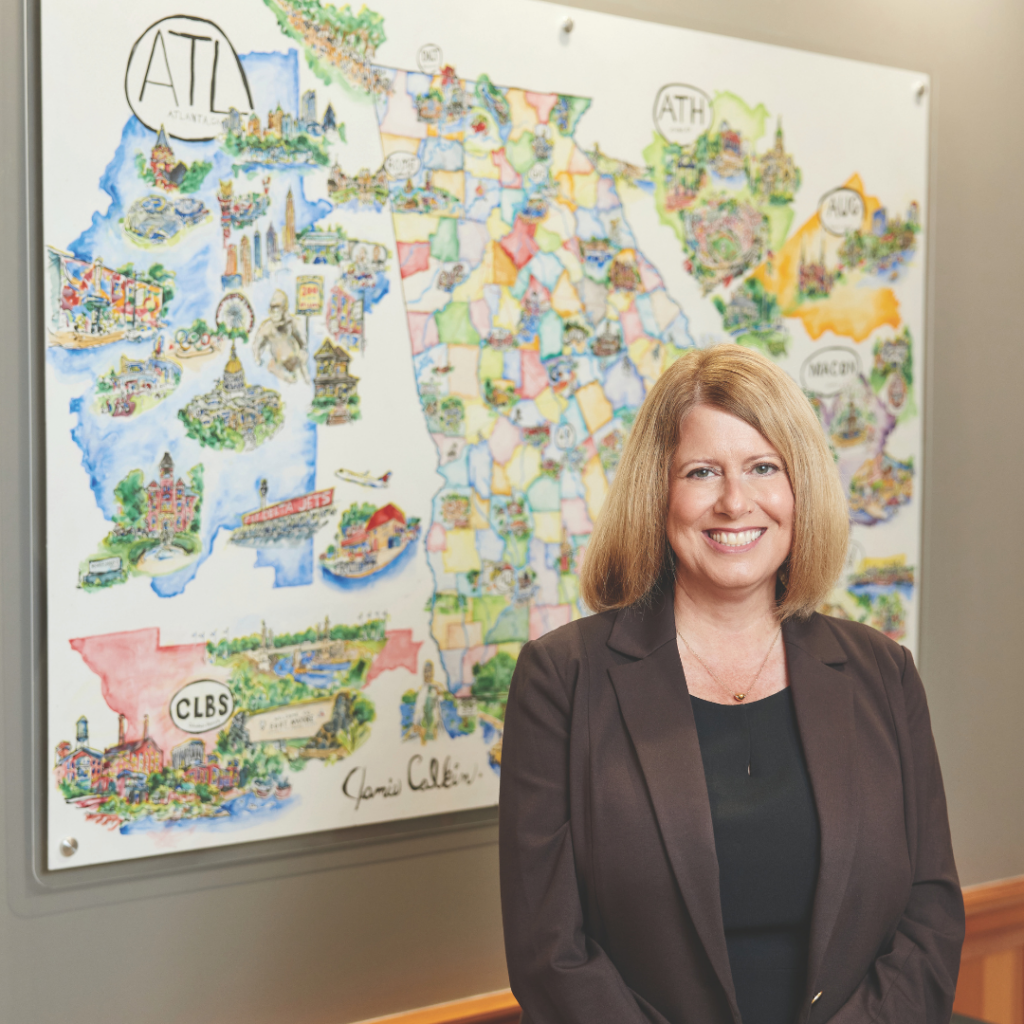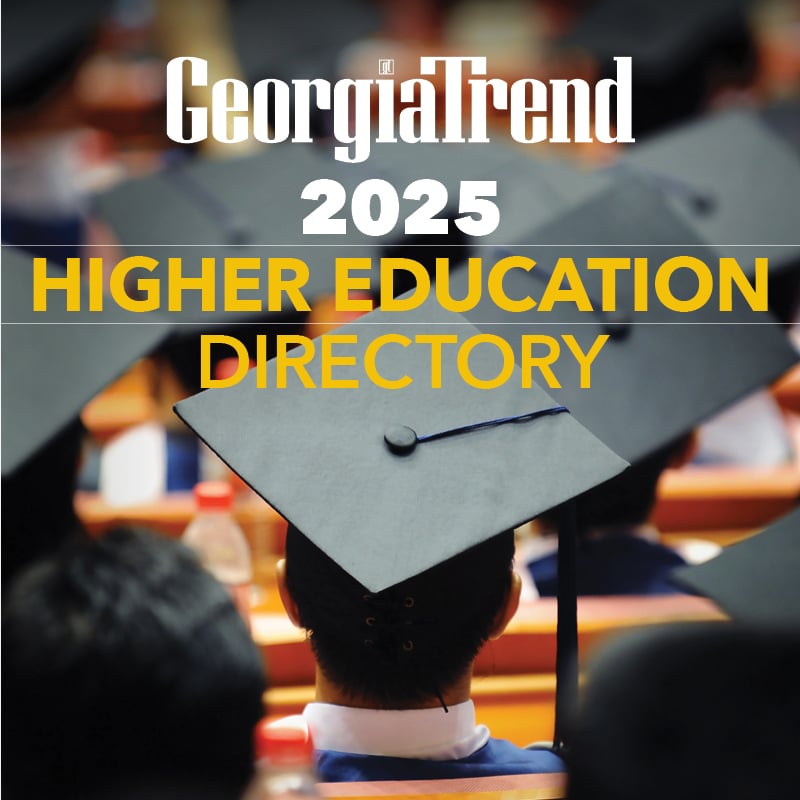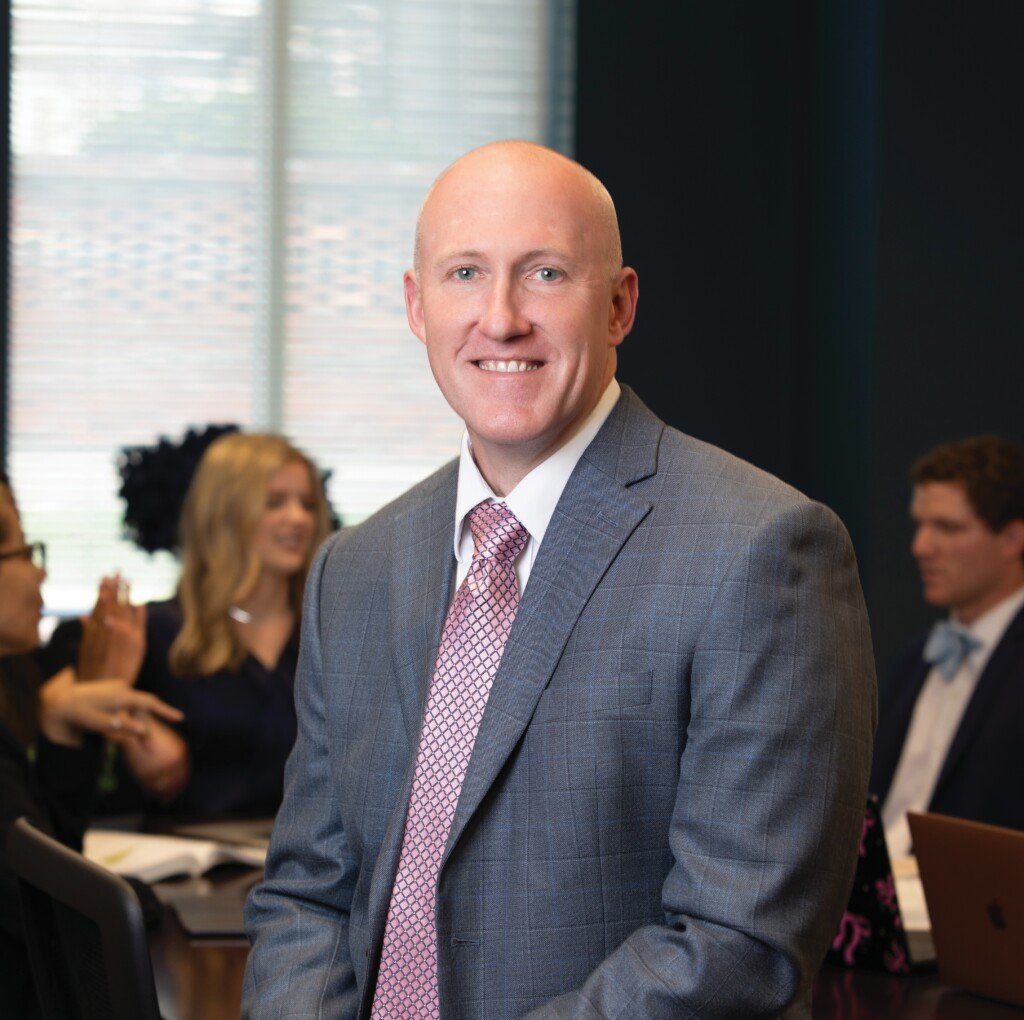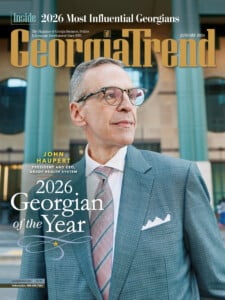Liberal Arts at Their Finest
Georgia College & State University gains popularity and prestige and continues to ascend.
The University System of Georgia boasts large schools known for research, engineering and business. Then there are those smaller gems, the liberal arts schools that focus on producing successful, well-rounded students. The state’s only public liberal arts school, Georgia College & State University (GCSU) in Milledgeville ranks high among similarly sized schools across the country, using a holistic approach to education, innovation, athletics and community involvement to help students succeed.
A Humble Beginning
In 1996, Steven Porch, then-chancellor of the University System of Georgia, made note that the one arrow missing from the system’s quiver was a top-quality liberal arts college. Georgia College was heading down that path, and that year it became official.
“And so, we were designated as the state’s public liberal arts university, and that dramatically changed the trajectory of Georgia College,” says President Cathy Cox, who took the lead in 2021. Cox is a natural for the job, having previously served as president of Young Harris College and as the first woman elected as Georgia’s secretary of state.
“Being here just taps into all of the great experiences I’ve been able to have, from public service, from practicing law, from being a journalist. I get to put it all to work here with the world’s greatest students and faculty and staff in a super setting.” Cathy Cox, President, Georgia College & State University
Cox says getting the designation as the state’s liberal arts college allowed GCSU to raise admission standards. “We know we get the cream-of-the-crop students who have already learned how to study and do well, so we have no remedial classes or those kinds of things,” says Cox, noting 95% of the school’s students come from Georgia.

Teacher-Scholar: GCSU Provost and Vice President for Academic Affairs, Costas Spirou: photo Daemon Baizan.
This fall GCSU welcomed the largest class in the history of the university, some 1,800 first-year students from a pool of 7,800 applicants, also the largest number to date. Total undergraduate enrollment is about 6,000, Cox says, plus an additional 1,200 graduate students, most of whom attend online. One secret to success at GCSU is its small class size. Less than 2% of classes have more than 50 students and all enlist an experiential, teacher-scholar model.
“That’s the model here. Students come to learn from each other in the classroom by talking about materials they want to talk about, with their peers and with their professors who know them personally,” says Cox.
Set Up for Success
GCSU Provost and Vice President for Academic Affairs Costas Spirou says he knows from research that students who participate in high-impact practices such as undergraduate research, intensive student experiences that engage them with faculty and community-based engaged learning are more likely to stay in school, have a higher GPA, graduate on time and be satisfied with their college experience.
To that end, in 2015 GCSU launched an initiative called Georgia College (GC) Journeys that requires students to complete five high-impact practices by the time they graduate. Starting as freshmen, students choose from experiences such as undergraduate research across all disciplines, a study abroad program, engaged community learning and internships – options offering experiential problem solving, critical thinking, data analyzing, teamwork and communication skills.
Programs such as GC Journeys have led the school to national recognition, says Spirou, including The American Association of State Colleges and Universities’ 2023 Excellence in Innovation Award for Student Success and College Completion. In 2020, it received the Campus-Wide Award for Undergraduate Research Accomplishments from the Council on Undergraduate Research.
“Much emphasis has been placed on connecting the students with the faculty members. We are not a research university, but we’re more than a teaching institution in the sense that we embrace what we call the teacher-scholar model,” says Spirou. “The idea is that faculty are involved in scholarly activities and the expectation is for them to engage the students, to collaborate with them and support them along the way.”
Center of Innovation and Entrepreneurship

Fostering Talent: Nicholas Creel, co-director of the Center of Innovation and Entrepreneurship: photo Daemon Baizan.
Collaboration and support are definitely in effect at GCSU’s Center of Innovation and Entrepreneurship. Nicholas Creel joined the faculty as a professor of public law before crafting a business plan for the center, which he now co-directs in its second year. The idea had been batted around for a bit, but Creel brought it to life and continues to expand its reach to students, faculty and the Milledgeville community.
The center was designed to be innovation-centric, focusing both outward to the community and inward to the college “to capture that latent entrepreneurial talent we know exists in the students,” he says. One way of doing that is through the B Quad – Bobcat Business Builder Bootcamp – bringing together 10 students and three or four faculty members per semester to brainstorm business ideas, learn how to create a business plan and finesse the art of the pitch. Another offering is the venture capital challenge, or VC-Squared, the center’s version of a mini Shark Tank, Creel says, in which students can present fully formed ideas for feedback.

Joel Saucedo, winner of the most innovative idea prize for his work on starting a business in the medical technology space: photo contributed.
For its outward focus, the center is working with businesses in need of consulting services and problem-solving projects both students and faculty can handle. Their first big contract – with audiobook production company Lantern Audio in Atlanta – was one in which the students were paid for their work, says Creel.
While the company had top-notch recording equipment and the vocal talent needed to record the books, it was looking at the idea of vertical integration that would cut out the middle-man and position the company to sell its own audiobooks. Creel says students built out a business plan and proposal series that showed how to create and launch the company’s own audiobook sales, with information on how much it would cost, how much maintenance would be required, how many users were needed to turn a profit, etc. The center seeks similar projects that can benefit from the student connection, says Creel.
Medically Speaking
A point of pride for the school is the impressive 95.4% average pass rate between 2017 and 2022 among GCSU nursing students taking the National Council Licensure Examination (NCLEX). That’s higher than the national average of 88.6%, In addition, in 2020, there was a 100% pass rate among graduate students in the areas of family nurse practitioner, women’s health, nurse practitioner and nurse midwifery programs, says Josie Doss, director and professor of the GCSU School of Nursing.

Enhancing Rural Healthcare: Josie Doss, director and professor in the GCSU School of Nursing: photo Daemon Baizan.
With these specialty concentrations, the graduate programs focus on healthcare disparities with a particular emphasis on rural healthcare needs, says Doss. Practice partnerships and funding opportunities are available to support the training of nurses committed to practicing in underserved areas.
“As you know, the access to rural healthcare is precarious in the state of Georgia, so we are enhancing that access for rural communities by encouraging our students, particularly our graduate students and nurse practitioners, to stay and practice in rural areas,” she says, noting the school has a grant that pays tuition for students who commit to practice in rural areas for a set period of time following graduation.
Also a standout is the certificate program in healthcare simulation, with curriculum designed for students to mimic real clinical experience, especially communication with patients and colleagues. Georgia College’s program prepares educators from all healthcare fields to use simulation in the training and continuing education of students and team members. Training through this simulation certificate program, the only one of its kind in the state, is provided in part through the Simulation and Translational Research Center. The center is one of only two in the University System of Georgia to have secured accreditation through the Society of Simulation in Healthcare, says Doss.
Students with medical school in their plans can apply for a medical culture seminar led by Ashok Hegde, a former tenured Wake Forest Medical School faculty member who is now the William Harvey Endowed Professor of Biomedical Science at Georgia College. Hegde accepts 10 high-performing pre-med students per semester into his mentoring program, a weekly two-hour class.
“I consider them my mentees until they get to medical school. … I give them individual attention, so my mentoring is tailored to each student’s strengths and weaknesses,” says Hegde, who completed his post-doctoral training in neuroscience at Columbia University.
While 100% of participants who applied to medical school have been accepted to date, getting them into med school isn’t the only goal of the program. “The way I run the seminar is [with a focus on] what a medical career entails on a day-to-day basis. So, once they understand the reality of practicing medicine, some decide that it’s not for them, and I’m OK with that. I don’t mean to push them toward medical school,” says Hegde.
Hegde presents students with case studies, just like he used to do for his first-year medical students. Cases are presented as if the patient is coming to an emergency room or outpatient clinic; slowly, all the information is revealed as students decide the next course of action. Finally, a diagnosis emerges. The idea is not to name the disease but to understand what causes the disease, as well as the treatment, says Hegde.
“They love that this is like playing medical detective,” he says. “It gives them a sort of a glimpse into what they are going to get in medical school.” The method is discussion-based rather than lectures, so along the way students identify learning issues or gaps in their knowledge. They follow up with research that they present to the class, so the students learn from each other, he adds.
Teaching to Teach

Medical Detection: Ashok Hegde, William Harvey Endowed Professor of Biomedical Science: photo Daemon Baizan.
Preparing educators on both the undergraduate and graduate levels is another area where GCSU excels, evidenced by their Elementary Education Tests 100% pass rate on the Georgia Assessments for the Certification of Educators (GACE), a professional content exam for teacher licensing.
The school caps its undergraduate majors in education to ensure the quality of its mentor-led, field-based model in which a faculty member works with students one-on-one. “Our students go out into the field in a classroom immediately in their freshman year,” says Holley Roberts, associate provost for academic affairs and director of the graduate school.
GCSU also mentors at the graduate level, grouping graduate and undergraduate students to help develop the professional networks that are so important to educators in the field. Their master’s programs often draw enrollment from those already in the field and teaching on provisional certification.
“We’re very hopeful that they will … remain in Georgia schools because we recognize we have a huge need. We’re constantly trying to think about how to fill that need, and we’ve made a lot of transitions to our graduate programs that are now all fully online to be more accessible,” Roberts says.

Mentoring Educators: Holley Roberts, associate provost for academic affairs and director of the graduate school: photo Daemon Baizan.
When it comes to literacy, GCSU recently received an A+ for early childhood education from the National Council on Teacher Quality. It was the only school in Georgia and one of the top schools in the nation to receive the high score, for going above and beyond the literacy standards in preparing teachers with the most effective, scientifically-based instructions for reading.
GCSU is home to the Sandra Dunagan Deal Center for Early Language and Literacy, named for the late Georgia College alum and wife of former Georgia Gov. Nathan Deal. “Our mission at the Deal Center is to propel every Georgia child to read proficiently and beyond, so with the College of Education receiving this recent accolade from NCTQ for the science of reading, we were just thrilled,” says Roberts.
Not limited to GCSU students and the Milledgeville community, the Deal Center provides professional development, community engagement and funding for grants and research statewide. Last year the center awarded over $1.8 million for literacy programming across the state, Roberts says. The center recently hosted the Governor’s Summit on Early Language and Literacy. In addition, over the last three years Georgia College welcomed 1,890 attendees to 23 GCSU virtual learning workshops.
It’s More Than Ball
Work hard, play hard isn’t a new concept at GCSU. In fact, it’s basically modus operandi at this NCAA Division II school that competes in 11 sports – six women’s and five men’s – in the Peach Belt Conference.
“I always like to say that, as an institution and as a department, we’re unique, we’re different and we’re very appealing. Our department falls directly in line with the mission and values of our university,” says Athletic Director Wendell Staton. “We take a very holistic approach and we’ve been able to have outstanding student athletes. First and foremost, we’re going to recruit and retain outstanding people who want the Georgia College and State University experience.”
Staton impresses upon students that being a college athlete excelling in their field of play is just one spoke in the wheel of a holistic college experience that also includes being an outstanding student, participating in campus clubs and organizations, competing in intramurals, and even applying for grad school and other next steps.
“I tell [students], if your experience is all ball, it’s probably not going to be a great experience because that’s not why you come to college. You come to college to advance your life, to have this experience, to move on and be an outstanding citizen in your community,” says Staton.
And the numbers prove that what they’re doing is working. Only four public Division II schools in the country boast an academic success rate over 90%, and GCSU is tied for the lead in that group with a rate of 94%. In addition, the athletics program has produced eight GCSU valedictorians since 2015.
In addition to shining in the classroom, GCSU athletes have brought home the Peach Belt Conference Team Sportsmanship Award three times in the last seven years. Winners are selected by other teams in that sport and are recognized as the team that best exemplifies the spirit of sportsmanship and generally conducts themselves with a high degree of integrity, character and class.
Moving Forward
In addition to its current award-winning efforts in curriculum, new offerings at GCSU include a data science major and a legal studies minor. Anticipated by summer 2024 is an environmental, social, governance certificate. In addition, last month GCSU was awarded a $100,000 grant from the Partnership for Inclusive Innovation to create a certificate program for solar power technology training. As part of the training, the school will partner with the city of Milledgeville and students will install a solar panel system and battery backup system on a city of Milledgeville building. Talk about innovation.
“I feel like the luckiest person around,” says Cox. “Being here just taps into all of the great experiences I’ve been able to have, from public service, from practicing law, from being a journalist. I get to put it all to work here with the world’s greatest students and faculty and staff in a super setting. So, I feel very blessed and lucky to be here.”










